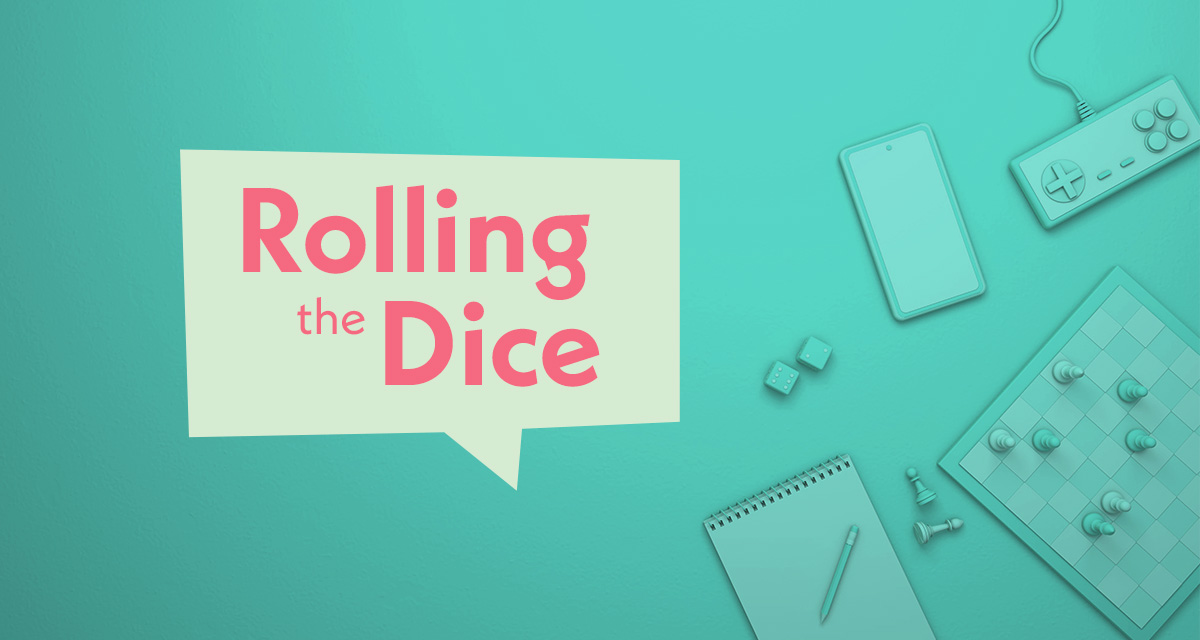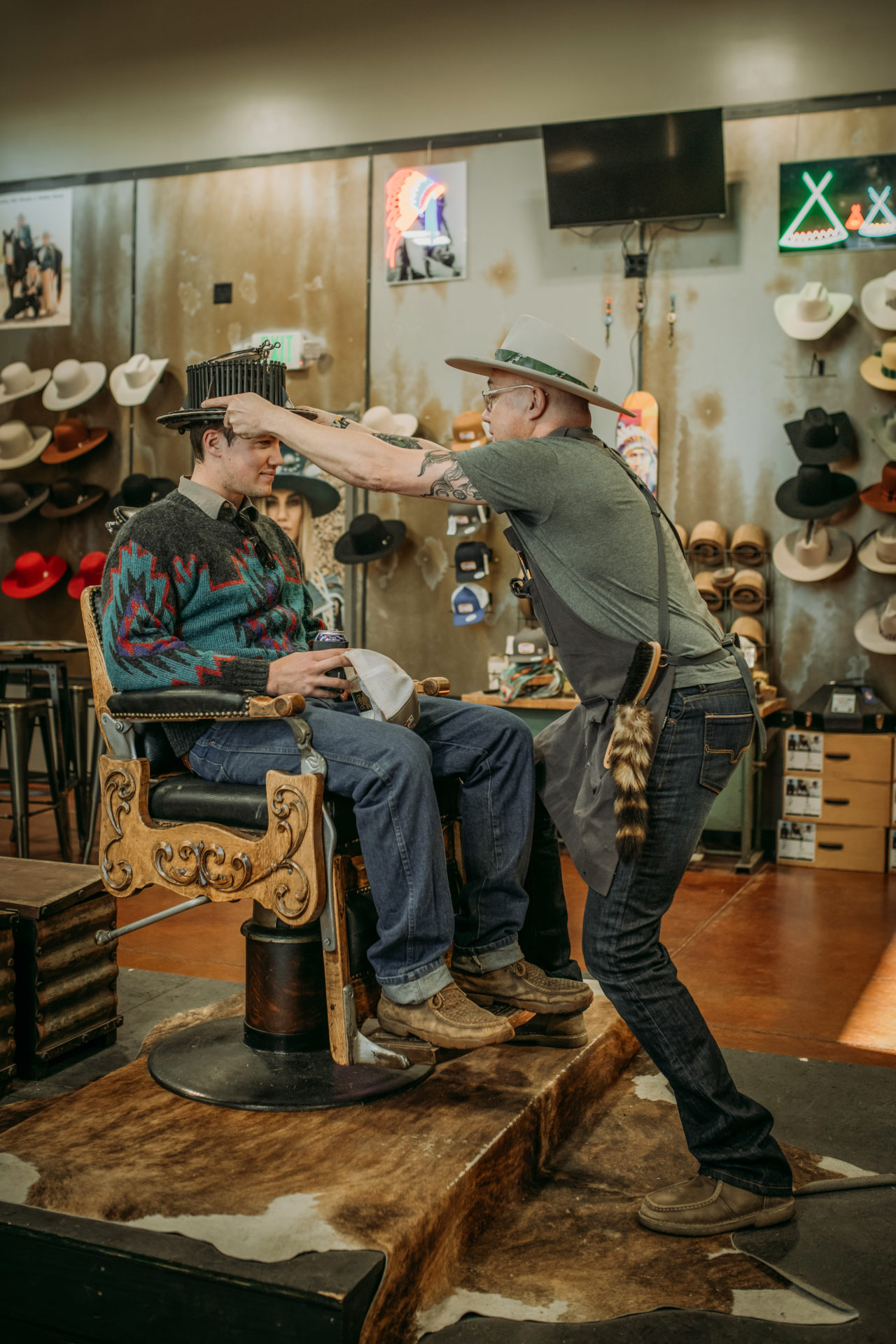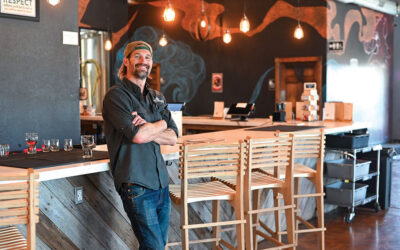– Businesses bank on board games to make a buck –
By Dan England |Photos courtesy of the Boomer House.
At the Boomer House, even the sandwiches are games.
Amy Mattox offers four sandwiches named after board games such as the Terra Mystica. There’s also mozzarella sticks named Jenga, which you probably get.
Then there’s the Dominion. The popular game involves players building a deck out of many kinds of cards, such as Treasure, Victory and Curse. The Dominion, therefore, is not so much a sandwich as it is a series of options, with four different base options (ham, turkey, mushrooms and cauliflower) and 15 extras. The Dominion can even be a salad. Mattox is proud of that one.
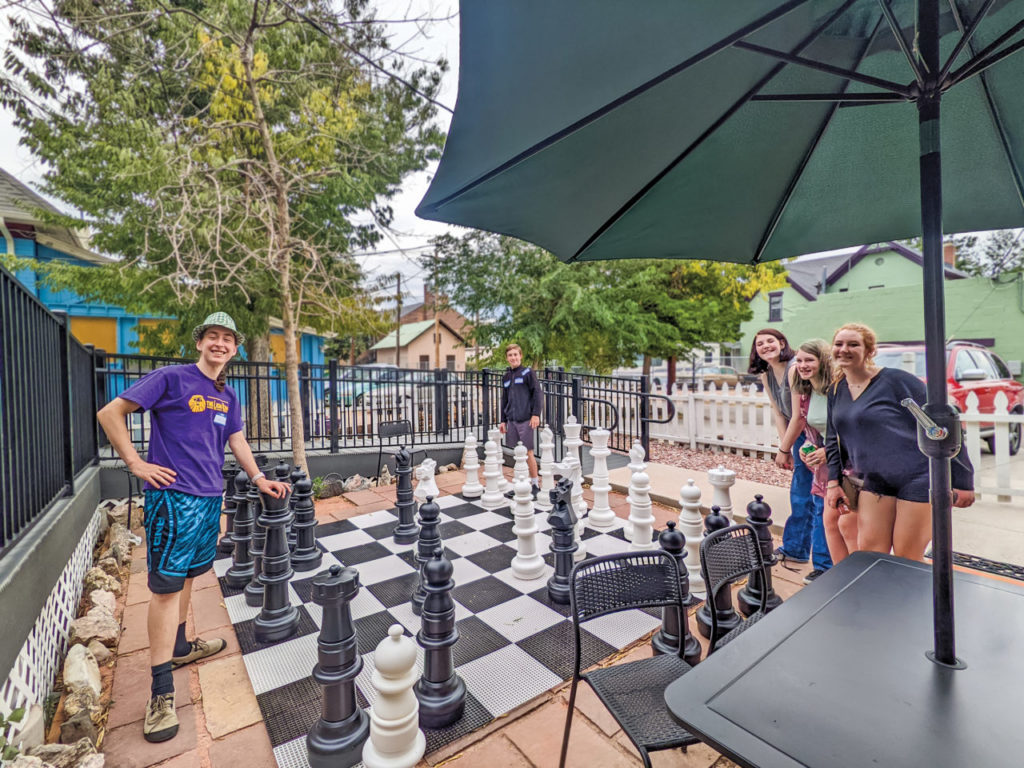
Audrey Mattox and Erin Chastain playing on an outdoor mega chess set at Boomer House in Greeley.
In the next room, Dominion naturally comes up in conversation after someone orders the sandwich, mainly because Augie Cook of Greeley loves to talk about it.
“I destroy everyone at Dominion,” Augie says. Brother Becket isn’t having it.
“You sure about that?” Becket says.
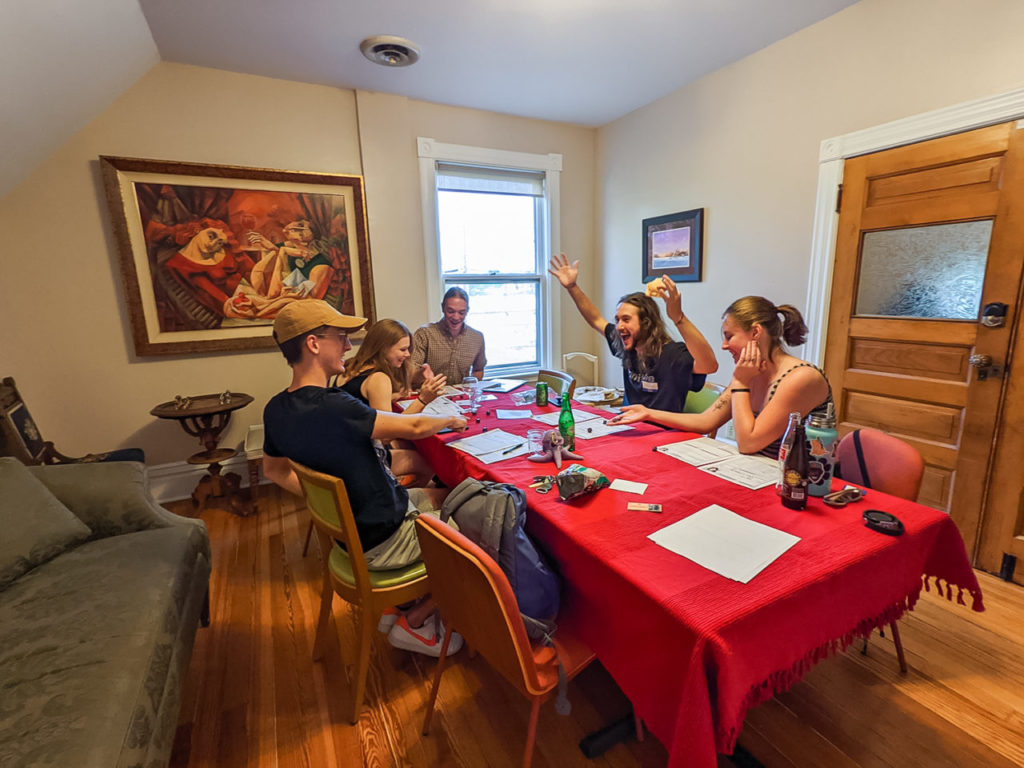
A group plays Dungeons & Dragons
in a private upstairs room at the Boomer House.
This is on a Sunday afternoon, when the Boomer House opens for younger players, though that is subjective, given that Augie and Becket look big enough to lift a Volvo. They are playing with Lane, Amy’s husband, and June, 13, one of their daughters. In the next room, Grady Chastain, 13, and another daughter, Audrey, 15, are playing.
It’s deep in the dead of summer, when people take vacations or relax by the pool, and there’s the Greeley Arts Picnic literally down the street in downtown Lincoln Park, so it’s a slow day. Grady, however, would add to the sparse crowd later, as some friends planned to meet him there for a Dungeons and Dragons game. They will likely play upstairs, on the big circular table, next to the room where people love to play Warhammer and across from the quiet room, where two can ruminate over chess or some Canadian game called Crokinoele that Amy described: You can ask her for the details.
Both Lane and Amy would know, as they have played every one of the dozens of games in the house, including the signed copy by one of their favorite designers. Many years ago, they started a game night for adults on Saturdays and one for kids on Sundays. Those take place at the historic Boomer House now. Amy and Lane bought the house a couple years ago and run a business there that hosts events and will have an AirBnB room soon, but the highlights of the week, for Amy and Lane, are the game nights. Amy was a part-time family physician —Lane still partly manages the clinic where she used to work—who wanted a break from medicine. She purchased the house with money she’d socked away working as a doctor.
They are one of several businesses in Northern Colorado banking on board games. Board games have made a comeback for quite a while now. Some places are retail centers, such as the Nerd Store, another Greeley downtown business that sells them, but others are cafes such as the Boomer House, which offers up places to host games as well as provides the games themselves.
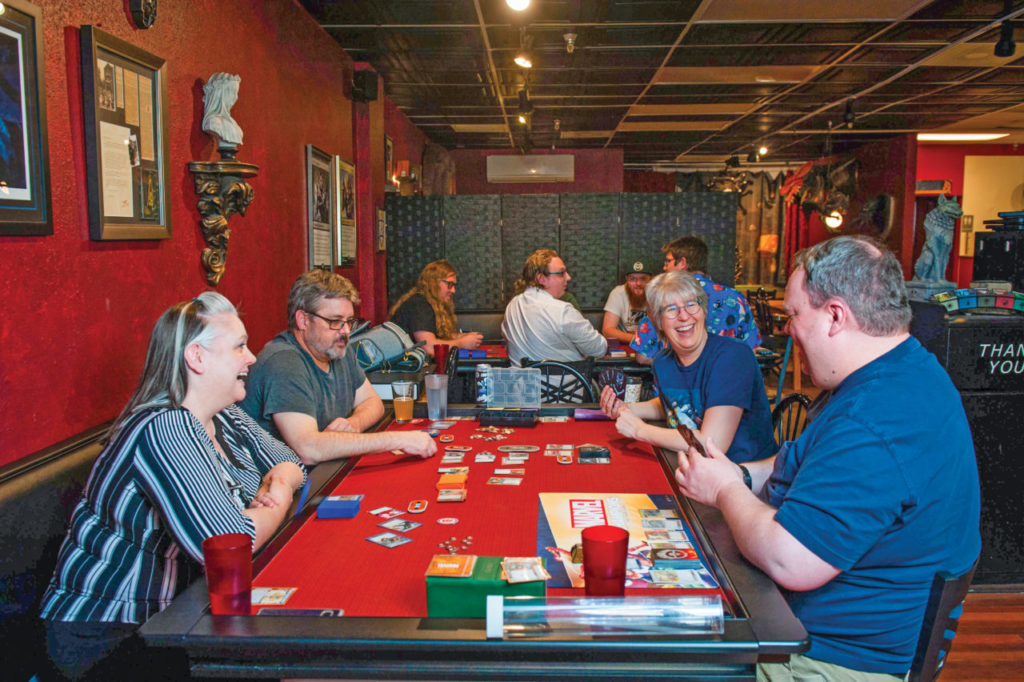
A group playing Marvel Champions the Card Game at the Haunted Game Cafe in Fort Collins. Photos courtesy of Haunted Game Cafe.
The difference is the Boomer House is essentially a nonprofit, though they don’t call it that. They charge a $5 minimum purchase for kids and $10 for adults on their game nights (and they do have adult drinks as well). They don’t intend to make a profit, though they hope it pays for itself one day (they already break even on the game nights). They want to support downtown and share their love of games, which they express by attending game conventions and reading about the latest games and decorating the home with framed artists’ renditions of the most popular board games.
If you want to play a game and they somehow don’t have it, they can get it for you: They even partner with the Nerd Store to borrow certain games. But they also don’t mind being hands-on, even a little pushy, directing you to a game you’d probably like or convincing you to fill an empty chair at another game: They recently went to another cafe in the Denver area and were turned off by the manager, who didn’t seem to care what game they played.
They want you to relax, purchase a sandwich and mostly just have fun with a board game, something you may have done when your relatives visited.
“What we are really showcasing,” Amy says, “is the game experience.”
Asian popularity, American profitability (sort of)
When Gary Sproul opened his Fort Collins Haunted Game Cafe back in 2009, they were so rare, he believes only one other one for board game play existed in Colorado. But they were really popular in Asia, which gave Sproul hope.
“I was very into coffee and games, and I thought the coffee would help pay for the gaming space,” he says. “If I was going to be my own boss, I wanted to do something I deeply loved.”
Sproul was a video game designer when he decided to go into business for himself.
Games such as Settlers of Catan helped revitalize board games, Sproul says. The more popular games of the 1970s and ‘80s, such as Chutes and Ladders and Life, were based heavily on chance. Even Monopoly, probably the most well-known board game, is based more on chance than the simple strategy it requires.
“American games in general were designed to be exciting,” Sproul says. “One card could change the game. It was too much like gambling. European games are designed to be played by families: There’s no player elimination, and strategy plays a big part.”
As with the Boomer House, having a space to host gaming isn’t very profitable, but he makes up the difference by serving drinks and saving some space for retail.
“The main revenue driver is the retail space,” Sproul says. “But we like having a gaming space. It makes it much easier to connect with our customers, and we can share this love of gaming.”
Whether it’s essential for a board game retail store to run games is hard to say. It’s a way to compete with the big-box stores that sell the more popular games (Catan and its off-shoots, for example, are ones they sell), and it encourages customers to fall in love with games they wouldn’t try otherwise. But the gaming real estate is expensive, and games cause long hours for employees or owners.
“A few game stores haven’t brought back games since COVID-19, and they’re doing fine,” Sproul says.
In fact, Games Ahoy of Loveland admits it’s a struggle to get customers to show up for board game events. Adam Ray, the store’s owner, doesn’t specialize in board games: They are part of his vast offering of retro video games, tabletop games and card games such as Pokemon or Magic: The Gathering. He did host a couple Catan tournaments, including one that was a national qualifier, and that brought out some people, both because of Catan’s popularity and because of the prestige of the event.
“We got people coming from other towns and states,” Ray says. “If you’re not doing that, it’s hard to get people in the door. With COVID and people just used to sitting at home, it’s tough to get people in the door.”
That’s not true, however, for trading card games and video games tournaments, Ray says.
“Trading card games-it’s fairly easy,” he says, “and something like Smash Bros., those go way stronger.”
Regardless, businesses that do specialize in board games continue to make a living.
“It’s been great,” Sproul says. “I spend a lot of time here, but I love it.”
Perhaps their joy is contagious. Sproul has one rule for his employees, many who seem to love playing as much as he does.
“I have a regular game night with friends,” he says. “We tell the employees to do that too. The one thing that is sacred, we tell them, is game night.”
________________________________________________________________
Dan England is a mountain climber, ultrarunner, freelance writer and coach who lives in Greeley with his three kids, a son and twin girls, his singing wife Valerie, and his herding dog Pepper.


